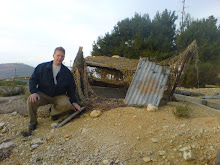 Broken Promised Land?
Broken Promised Land?I returned from Israel on Friday in some ways more confused than when I left a week ago.
It's been very easy as an outsider to criticise Israel for being heavy handed with her neighbours (see posts passim) but in many ways going there, and especially meeting the people, makes life for me more complicated and, to be honest, a little less comfortable.
The first thing to point out is that Israel herself is riddled with doubt, both about the Lebanese conflict and the security fence. As a vibrant free democracy such doubt is visible daily in the newspapers and in the pubs and restaurants where politics is the main point of daily discussion - in vivid contrast to our obsession with the goings on of various C list celebs in this country; and most of her Muslim neighbours where political dissent is not allowed.
Undeniably the security fence represents an unacceptable restriction on Palastinians, in my view making their economy totally unviable. Aside from the fact that it is far from the 'Berlin Wall' as presented in our media (less than 5% of it is concrete, the rest is security fencing as illustrated above) the fact of it's existance creates a divide between Jew and Arab where in many areas there didn't used to be one; compounding an already difficult racial divide and making the have and have-not division even more stark than it already was.
What has driven the Israelis to such drastic action is the plain fact that no-one else is able to defend their country against constant missile and bomb attacks from neighbours; worse, there is almost no-one of authority in either Gaza or Lebanon for the Isrealis to do deals with, even if they wanted to. The fence does at least work, the number of suicide bombings has fallen to virtually nothing since the main parts became operational.
Isrealis that we spoke to everywhere - even in the IDF, (Isreali defence Force) are desperate for a strong and clear leadership to emerge amongst the Palastinians so that they can try to negotiate a lasting deal on a viable two-state solution; at which point they would gladly dismantle the fence.
But the only leadership available to talk to, Hamas, have remained committed both to armed resistance and the destruction of Israel and until they say otherwise, Isrealis feel compelled not to deal with them.
There is an outside chance that drastic segregation in this way might just persuade more moderate Palastinians that they need open relations with Israel - they need access to Israeli businesses and consumers for jobs and prosperity, but it's a long shot in my view.
But in the end I concluded that, faced with similar circumstances, we would do the same as the Israelis.







.jpg)



1 comment:
I am trying to understand the source of this conflict. Why is it Isreali people as a whole did not have a place to reside on earth in the first place?
Post a Comment